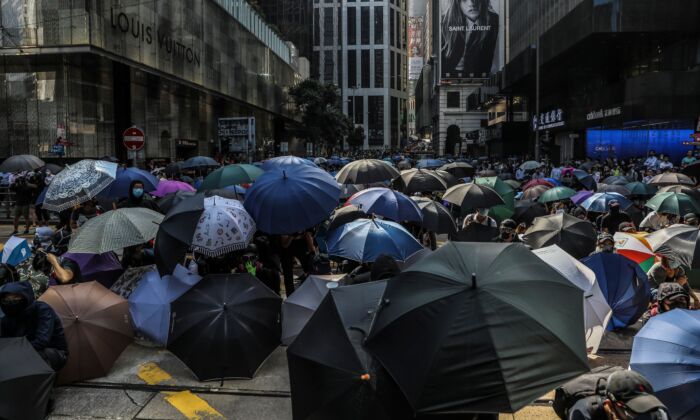Geoff Regan Looks to Keep Role as Speaker of the House of Commons in Canada
Beijing gave signals that it had plans in store for quelling protests in Hong Kong, as police escalated their tactics in dealing with protesters this past week.
Geng Shuang, the spokesman for China’s foreign affairs ministry, said during a Nov. 13 press briefing that Hong Kong pro-democracy protesters were “enemies of the people…who have pushed Hong Kong into a critical situation by launching large-scale violent activities.”
That labeling echoed Lam’s description of protesters during a Nov. 11 press conference.
Geng said: “The top priority for Hong Kong is stopping the violence and restoring order. The Chinese central government strongly supports Hong Kong government, police, and judiciary in taking effective measures to severely punish illegal and criminal activities.”
This is the first time that Geng used “top priority.” He previously used the words “most important” or “important” task.
Meanwhile, several senior Hong Kong officials attended a late-night meeting at the official residence of Hong Kong leader Government House, local media RTHK reported. The officials did not leave until after midnight, the outlet report, adding that riot police were unusually stationed outside the premises during the visit.
The late-night visits has prompted speculation that city leader Carrie Lam convened an emergency meeting to deal with the escalating protests.
The day earlier, the city was rocked by one of its most violent days since protests began in June. Police besieged a university campus, firing tear gas and rubber bullets as student protesters erected roadblocks and hurled bricks and petrol bombs in response.
Earlier in the week, a student protester was injured after being shot by police with a live round, sparking widespread anger and international condemnation. This marked the third protester injured by a police shooting during the protests.
Support from Beijing
As police action escalated in recent days, the Chinese regime ratched up its support of Hong Kong authorities’ efforts to quell the protests.
The Chinese Communist Party’s (CCP) head legal agency, the Central Political and Legal Affairs Commission, responded to the news of a third protester being shot by police in a post post on WeChat, a Facebook-like social media, on Nov. 12. It said: “If [Hong Kong police] didn’t fire at that moment? What’s the use of the gun? What’s the use of police?”
China state-run media Global Times in a commentary on Nov. 13 warned that Beijing could use “direct intervention” under Basic Law, the city’s mini-constitution, to “safeguard” Hong Kong.
“The place where rioters wreak havoc is a short drive from the nearest station of the Shenzhen Armed Police Force, and even closer to the People’s Liberation Army in Hong Kong,” It said.
The Global Times added that “direct state action will be inevitable,” if the actions of “rioters” escalate leading to “more severe and widespread disorder.”
Next Step
Zhang Xiaoming, director of the Hong Kong and Macau Affairs Office within the cabinet-like State Council, was scheduled to visit Hong Kong on Nov. 15. Local media HK01, citing an anonymous source, reported on Nov. 13 that Zhang’s trip was abruptly canceled. As of press time, neither Beijing nor the Hong Kong government has confirmed the cancelation.
The report cited a source close to Beijing who said this indicated that the Chinese regime would take new actions in Hong Kong to quell the ongoing protests.
U.S.-based China commentator Tang Jingyuan said “It’s likely that the Chinese government won’t control Hong Kong directly.” Rather, the Hong Kong government is likely to enact more restrictive regulations via the Emergency Regulations Ordinance, he predicted. The colonial-era law gives the city leader broad powers to set rules during a state of emergency.
Lam has already invoked the law to ban Hongkongers from wearing facial masks in public gatherings.
Tang said that the signals from Beijing indicate they may have instructed the Hong Kong government to use more aggressive tactics.
Tang doesn’t think Beijing would send in troops, as it has publicly said it supports the Hong Kong government’s handling of the protests so far.
Rather, Hong Kong is likely to continue using police to clamp down on protests, he said.
This article is from the Internet:Beijing Signals Tougher Tactics on Hong Kong as City Government Convenes Emergency Meeting
Trump Expected to Delay European Auto Tariff Decision, Say EU Officials
